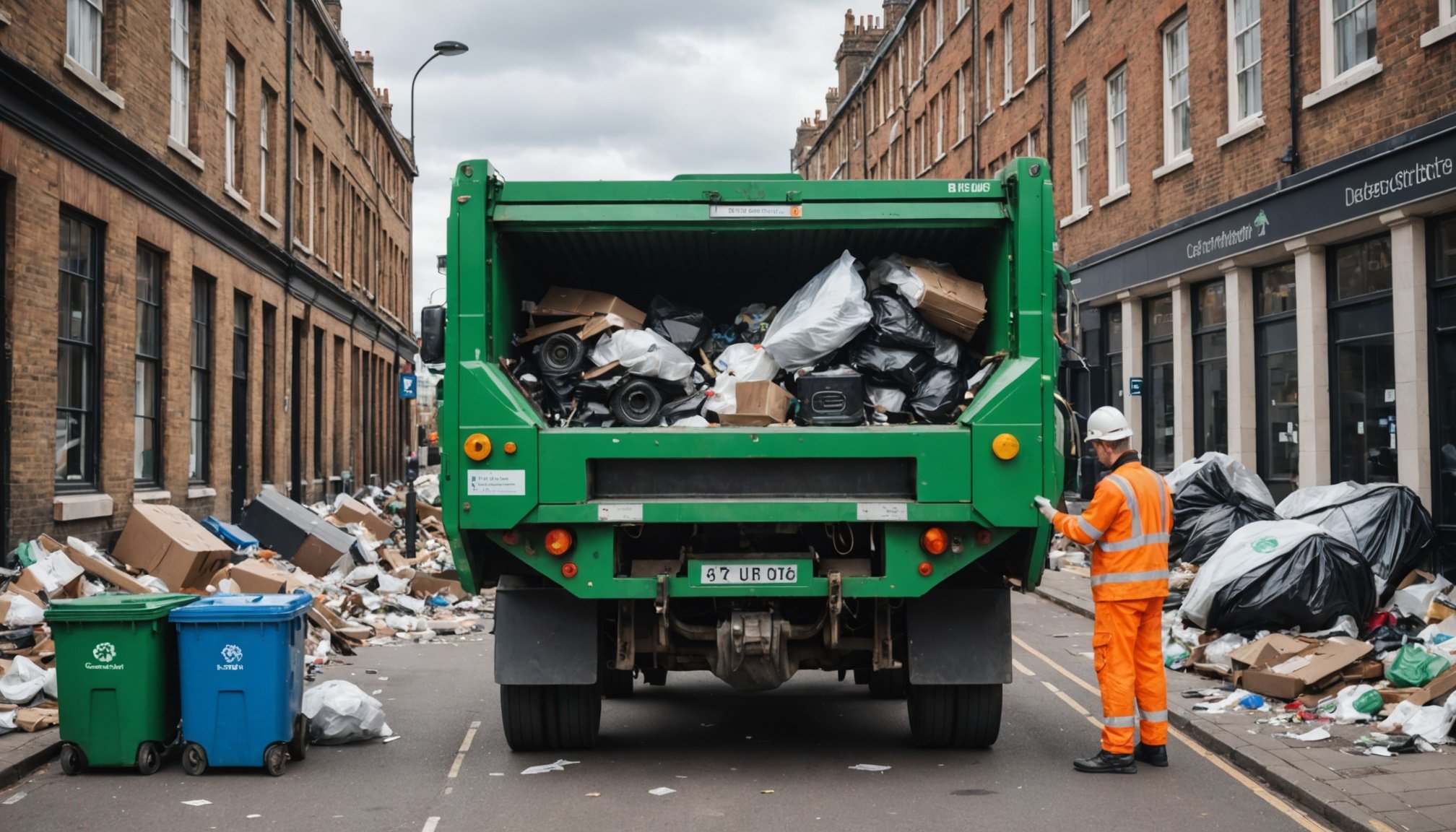Transforming Waste Management in the UK: The Impact of Machine Learning on Creating a Sustainable Future
The Urgent Need for Sustainable Waste Management
In the UK, the management of waste has become a critical issue, both economically and environmentally. The traditional methods of waste disposal are no longer sustainable, and the country is now transitioning towards a circular economy. This shift is driven by the need to reduce waste, increase recycling rates, and minimize the environmental impact of waste management.
The UK government has set ambitious targets to achieve this transition. For instance, the Environmental Targets (Residual Waste) (England) Regulations 2023 aim to reduce the total mass of residual waste to 287kg per person by 2042, a 50% reduction from 2019 levels[2].
Also to discover : Revolutionizing Customer Support in UK Tech: The Power of AI and Natural Language Processing
The Role of Machine Learning in Waste Management
Machine learning (ML) and artificial intelligence (AI) are revolutionizing the way waste is managed. Here are some key ways these technologies are making a difference:
Improving Waste Sorting and Recycling
Companies like AMP and Greyparrot are using AI-powered robots to sort recycling more accurately and efficiently. AMP’s technology, for example, uses deep learning to analyze millions of images of waste, identifying materials by recognizing patterns in colors, textures, shapes, and logos. This not only increases the speed of sorting but also reduces contamination rates, which is a significant challenge in the recycling industry[3].
Topic to read : Harnessing AI for Instant Market Insights: A Complete Resource for UK Financial Institutions
- **AMP's AI Systems:**
- Use deep learning to analyze images of waste
- Identify materials by patterns in colors, textures, shapes, and logos
- Sort trash faster and more accurately than humans
- Reduce contamination rates
- Operate 24/7, addressing labor shortages
- **Greyparrot's AI Technology:**
- Deployed in over 50 recycling facilities in Europe
- Use cameras and machine learning to analyze waste on conveyor belts in real time
- Identify materials such as plastics, paper, and metals
- Help facilities reduce contamination and improve sorting efficiency
- Encourage manufacturers to redesign packaging for easier recycling
Enhancing Food Waste Management
Food waste is another significant area where machine learning is making a difference. Marks & Spencer (M&S), for instance, has extended its partnership with WasteInsight to use ML technology to reduce food waste. This technology provides markdown prices to encourage sell-through, manages expiration dates more effectively, and improves forecasting accuracy. According to Chris Thomas, head of product for store operations at M&S, “The WasteInsight solution has delivered significant waste reduction benefits over the past three years, as well as improving overall operational efficiency”[1].
Streamlining Waste Collection and Supply Chain
AI is also being used to optimize waste collection and the supply chain. Digital platforms like TruckPay are enhancing efficiency and transparency in the waste management sector. These platforms offer real-time tracking of materials, streamlined logistics, and various cashless payment options, including virtual wallets and instant transactions. This not only improves the operational efficiency but also reduces the environmental impact by minimizing the need for physical transactions and enhancing the use of renewable energy in transportation[3].
Government Initiatives and Regulatory Frameworks
The UK government is implementing several initiatives and regulatory frameworks to support the transition to a circular economy.
Packaging Reforms
Defra’s packaging reforms are a key part of this strategy. These reforms include Extended Producer Responsibility (EPR) for packaging, Simpler Recycling, and a Deposit Return Scheme (DRS) for drinks containers. These measures are expected to reduce residual waste by incentivizing and improving recycling rates. For example, Simpler Recycling will standardize recycling practices across England, making it easier for people to recycle the same materials at home, work, or school[2].
- **Extended Producer Responsibility (EPR):**
- Holds producers responsible for the environmental impact of their packaging
- Encourages sustainable packaging design
- **Simpler Recycling:**
- Standardizes recycling practices across England
- Makes it easier for people to recycle the same materials in different settings
- **Deposit Return Scheme (DRS):**
- Incentivizes the return of drinks containers
- Reduces litter and increases recycling rates
Circular Economy Targets
Scotland’s Circular Economy Route Map to 2030 outlines several strategic objectives, including challenging the current approach to consumption and production, reducing food waste, and embedding circular construction practices. These objectives are designed to mainstream reuse and repair, incentivize sustainable choices, and ensure producers take responsibility for the environmental impact of their products[4].
Real-Time Data and Predictive Analytics
Machine learning and AI are not just about sorting and recycling; they also play a crucial role in data analysis and predictive analytics.
Real-Time Monitoring
Companies like Recycleye use AI and robotics to monitor and sort materials in real-time. Their systems scan each item on the material stream 24/7, categorizing them by material and object based on visual characteristics recognized by machine learning algorithms. This real-time data helps in optimizing waste operations and improving recycling rates[5].
Predictive Analytics
In the metals recycling industry, AI algorithms analyze large volumes of market data to predict future market trends. This helps recyclers make informed decisions regarding the buying, selling, and inventory management of scrap metals. By optimizing production and managing inventory based on expected demand, recyclers can improve their operational efficiency and reduce waste[3].
Smart Cities and Sustainable Waste Management
The integration of AI and machine learning into waste management is also transforming urban environments into smart cities.
Smart Waste Collection
Smart waste collection systems use sensors and AI to optimize waste collection routes and schedules. These systems can detect when bins are full and need to be emptied, reducing the number of unnecessary collections and minimizing energy consumption.
Energy Efficiency
AI can also help in designing sustainable packaging that is easier to recycle. Companies like WestRock are using AI to create packaging that minimizes waste and reduces the environmental impact. This aligns with the broader goals of transitioning to a circular economy where resources are reused and waste is minimized[3].
Practical Insights and Actionable Advice
For individuals and businesses looking to contribute to sustainable waste management, here are some practical insights and actionable advice:
Reduce Food Waste
- Use machine learning tools like WasteInsight to manage expiration dates and optimize food sales.
- Implement markdown prices to encourage the sale of near-expiration items.
- Donate unsold food to charities or food banks.
Improve Recycling Rates
- Use AI-powered recycling facilities to sort materials more accurately.
- Standardize recycling practices across different settings to make it easier for people to recycle.
- Educate consumers on what can and cannot be recycled.
Optimize Waste Collection
- Use digital platforms to track waste collection in real-time.
- Implement smart waste collection systems that detect when bins need to be emptied.
- Streamline logistics and use cashless payment options to enhance efficiency.
The integration of machine learning and AI into waste management is a game-changer for the UK’s transition to a circular economy. From improving waste sorting and recycling to optimizing waste collection and supply chain management, these technologies are driving sustainability and efficiency.
As Matanya Horowitz, founder of AMP, noted, “Recycling rates have stagnated in the United States. Our AI systems help recover more materials, reduce contamination, and ultimately optimize waste operations.” This sentiment is echoed across the UK, where government initiatives, technological advancements, and practical applications are all working together to create a more sustainable future.
### Key Takeaways
- **Machine Learning in Waste Sorting:**
- Improves accuracy and efficiency
- Reduces contamination rates
- Operates 24/7, addressing labor shortages
- **Government Initiatives:**
- Extended Producer Responsibility for packaging
- Simpler Recycling
- Deposit Return Scheme for drinks containers
- **Real-Time Data and Predictive Analytics:**
- Monitors and sorts materials in real-time
- Predicts market trends to optimize production and inventory management
- **Smart Cities and Sustainable Waste Management:**
- Optimizes waste collection routes and schedules
- Designs sustainable packaging
- Minimizes energy consumption and environmental impact
By embracing these technologies and strategies, the UK is well on its way to achieving its environmental targets and creating a more sustainable future for all.











